Hi Williams,
I really appreciate efforts you shared with us, its very helpful to learn portugeues language in short time, I was learning the words by downloading some softwares from my smartphone, but after reading your tips I am able to quickly learn sentences.
Obrigado.
Zohaib.
LEARN OVER A THOUSAND PORTUGUESE WORDS IN A FEW MINUTES
Hello Zohaib,
I'm glad to hear that you're finding the tips helpful in your learining process. Keep up the good work. Learning a new language is never easy, but it has many rewards, some that you may not even imagine.
Cheers,
William James Woodward, Expat-blog Experts Team
Thanks for all the info!!
Great stuff :-)
Cheers,
Doug
wjwoodward wrote:You may want to try paltalk.com as well, you register for free. They have numerous chat rooms that you can select by region, language, interest, etc. You can go online in the Brazilian rooms and hear them speaking, practice your language and watch as they write as well. It is very helpful, and if you let them know you're learning the language they are usually all quite willing to help with tips and suggestions.
There is a strict etiquette for the rooms, you click the button to raise your hand when you want to speak and enter the line-up, when your turn comes the mike is yours for as long as you like. When you type a message you don't need to wait.
Cheers,
sounds like u're a paltalker as i used to be sir! :-)
Yes you got it!
i want to talk pakistani in brazil
Hi brother
Qadir niazi wrote:i want to talk pakistani in brazil
Good luck with that! If it's difficult for us English speaking expats to meet (face-to-face) other English speakers in this country and there are lots, just imagine how much more difficult it's going to be for you to find your fellow Pakistanis here.
Thank you sooooooo much ... t is really awesome and helpfull .. sir .. i am humbly requesting you to post some more tips .. it will be vety helpfull to peoples like me who are struggling to learn portugese .. or email me at [email protected] ... its my humble request .. i deeply wish to speak portugese fluently ...
Thank You William James for teaching useful Brazilian Portuguese words.
Great Post. Very Helpful.
Thank you.
You need to be honest about this, unless your addressing someone who is multi lingual, or of much higher intelligence, of which neither apply to me personally.
I've been here for four years, and it's a struggle! I can barely carry a conversation!
Being from Canada myself, I thought there would be schools teaching PSL (derived from ESL), but that does not exist. Only schools that teach to "estrangeros" are 3-4 times the price of an english class. With so many portuguese speaking people here, I can't understand the outrageous price.
Other than that, anyone and everyone who speaks some english wants to only speak english with me. Where does that leave my portuguese? Nowhere? I'm so starved for conversation, I stop mormons in the street, just to have someone to talk with! (i'm serious).
I am very ashamed about my "lack of" ability to speak, so I lie to people when they ask how long I have been here.
Where do I turn? What do I do to get out of this rut?
I want to live a "normal life". I want to be able to understand the news, carry a conversation.
Converse with my neighbors. But ... I cannot, and life is not so good.
only a few "hundred" words from turning things around, but no where to go.
Every time I learn a word, and don't get the opportunity to use it within 10 minutes ... it's gone.
As for internet (aside from english), there are more opportunities to learn Chinese, German, French, Japanese or Spanish than Portuguese.
What do you recommend?
Please don't say "watch tv".. please! 20 minutes of blah blah blah, drives me crazy!!
I am serious.
Maybe i'm just stupid.
Thanks for your patience.
Oh, by the way. I read something you posted some time ago about having documents with your parents names on it. Canada is about the only country that does not do this. I found out the hard way!
When I was learning Portuguese back in 2001 I took relatively few classes at a school in Vancouver, but they helped more than I can ever say. What I did was immersed myself in the language as much as I could in a non-Portuguese speaking country. I began to attended events put on by the local Brazilian community where I made Brazilian friends. I began going to a church that had a Brazilian congregation and services held in the Portuguese language. I listened to Brazilian music on CD and there is also something you can do here that I couldn't do in Canada, that's watch DVDs in Portuguese (audio) with Portuguese subtitles. I recommend that you watch a film at least twice. The first time you watch it let it play with Portuguese audio ONLY. While you may not understand much from the audio track, you'll probably understand the general idea by the action and situation. Watch again a second time with Portuguese subtitles and you'll understand even more. If you can handle a third time even better, same thing audio and subtitles in Portugese ONLY. Never use English subtitles because that's only going to erase all the work you're doing to learn the language.
Take a look at Portuguese language news websites like www.g1.globo.com and www.r7.com read the news articles (OUT LOUD) this will give you a chance to both speak the language and to see it in the correct grammatical form while reading it. Hopefully it's going to increase your vocabulary too at the same time.
The more you expose yourself to any language the more of that language you're going to learn. Do not be afraid to use your Portuguese in public no matter how limited you believe it may be. Brazilians go nuts for people who express enough interest in THEIR language that they want to learn it. They are not going to make fun of you, but rather they're going to be impressed and want to help you grow and improve in the language. They'll say things like, "that's great, but here's a better way to say it..." or "you're doing great, but the way we say it is... " DO NOT take this as criticism, understand it for what it really is - A LESSON.
I think that what is holding you back is really your own fear of using the language, being timid to speak. Gosh, what if I make a mistake? Get rid of that flawed thinking as quick as you can... we only learn through our mistakes. Use the language at every opportunity, even if you feel uncomfortable about it. The discomfort and timidity will pass, trust me. When your Brazilian friends want to speak to you only in their limited English they're doing it for exactly this reason, so why shouldn't you do the same? Tell them that you don't mind, but that sometimes you want your conversations to be in Portuguese only too.
I think if you lose your fear of speaking Portuguese, you'll surprise yourself. I can assure you that you'll start improving almost right away. If you learned French in school in Canada then you've already got a pretty good base in Portuguese because the two languages are similar in many ways; the verbs all conjugate in pretty much the same way, there are masculine and feminine words, accentuation is the same. There is no magic wand, no secret formula for learning any language - you just have to get out there and use it.
With languages, I've found out as a teacher for the past 26 years that really we are often our own worst enemy.
Hi William,
I think you might be slightly overstating the closeness of French and Portuguese. I speak French fluently because I have lived in France most of my life. They are in no way mutually intelligible languages. I see my French friends unable to even get the gist of a conversation in Portuguese. OK, they are both Romance languages but you need to be a bit of a linguist to see the links. As for tenses being similar, je ne suis pas d'accord du tout! There is a lot more French in the English language than there is French in Portuguese, or vice versa. I would say it helps to learn Portuguese if you have already studied any other language to a decent level.
I am not saying they are the same, rather that they have many common features such as the verb conjugation, accentuation and word gender. I was horrible in French in school, however when I started learning Portuguese as an adult all that I had learned about French made it that much easier to understand what I was learning about Portuguese, because it started to fall into place more easily.
English verbs conjugate in so many different ways that students can't grasp it easily, with very few exceptions we do not have any masculine words or feminine ones and we do not use accents with letters. You cannot tell how a word is pronounced in English by the way it is spelled because we don't use accents. The romance languages do and it is much easier to thus determine the pronunciation as a result. You really can't apply English grammatical concepts to Portuguese, but you certainly can apply romance language grammatical concepts to Portuguese. Also many English grammar rules such as not using double negatives don't exist in Portugese. Example: Não chore não menino, a tua mãe está vindo.
It's quite likely that anyone who has a basis in Spanish would find Portuguese even easier to pick up still.
It appears to work in reverse too. I know ZERO Spanish or Italian for example, however when I see passages written in either of those languages now I certainly am able to understand a little bit of what is being said. I would not have understood a single word of either before I learned French and Portuguese.
Now I have seen Spanish-speakers and Portuguese-speakers achieve a level of mutual understanding. I witnessed that about a month ago.
And I have seen French-speakers who have studied Spanish able to competently work things out in Portuguese.
But your average French person is unable even to identify spoken Portuguese as a European language! Verdade!
Also, I was recently in Italy with a Brazilian friend. He's a lecturer in English, French and German linguistics at UNEAL, Alagoas! He preferred to speak to all Italians in English! They apparently didn't understand a word when he spoke to them in Portuguese.
Here is a link to add for those who are studying Portuguese
Ostensibly to help Portuguese-speakers learn English, it also works in reverse. I like the fact that you have both languages on the same page. You can back translate and test yourself.
http://www.bbc.co.uk/portuguese/topicos/aprenda_ingles
Thanks for your comments.
For the most part, your correct, though I generally don't have any fear to use portuguese.
Mostly, it is "laziness", and easily gravitating to people speaking english. To lazy to bring a notebook and pen.
It's frustrating when they don't understand me, because my accent is very strong, and need to use english words to complete most sentences. This confuses people.
I know more words in Chinese than French. So, no help there.
Only time in my life I regret not learning French. It would have helped immensely.
Yet, I know people in Canada who have lived 30 and 40 years, and their English is non functional.
I don't want to be like that.
Yeah, I hear you! Like I said there's no magic bullet. You really have to just force yourself to use the language as much as possible. Don't let yourself get sucked into English conversations and just hammer away at the Portuguese. Listen very carefully to the people speaking and try and imitate their pronunciation.
Remember there are NO hard "R" sounds in Portuguese. To us they come off sounding like "H" - things like Rio which sounds like He-oo; or ribanceira which sounds like hi-ban-say-ra. Oddly enough many of their "H" words the "H" is mute especially when followed by a vowel: habilitação thus comes out as a-bili-ta-saon and horrível like oar-evil.
You'll never lose your "gringo" accent completely when speaking so don't worry about it. After 13 years my pronunciation is as near to perfect as I'm ever going to get it. It's bang on must of the time, but everyone understands me perfectly, but still knows I'm not a Brazilian when they hear me speak.
There is also one big advantage of speaking Portugese to the best of your ability. You won't be spotted a mile away as a "gringo" tourist and end up paying "gringo" tourist prices for everything. The better you speak Portuguese the better your chances of getting lower prices. That also depends on learning the fine art of haggling over prices, which is a big part of the Brazilian culture.
haha, haggling is not very Canadian!
I lived in BH for 2 years, and now in RS for 2 years.
it's like different languages to me. Like from Vancouver to Cape Breton!
I got over my fear of speaking some time ago. I love the reaction on peoples faces when say something ... Their face contorts, like ... "what the f ... you saying?" then, sometimes they get it!
Usually not.
Do you, or anyone reading this knows of a good website to help with portuguese?
Thanks, and take care.
1
please recommend your source.
After 4 years here, my portuguese sucks so bad!
Thanks very useful
Hi Albertan,
I hear you! Actually I learned Portuguese in Vancouver with a Brazilian teacher in 2001 just shortly before coming to Brazil. I studied for several months on my own using computer based programs and when I finally started taking formal classroom training jumped right to the Intermediate level. I also (as an English Immersion Teacher) created my own Portuguese Immersion environment; exposed myself to the language almost 24/7. I created a social circle made up almost exclusively of Brazilians, began attending church services with an all Brazilian congregation, listened to Brazilian music and read everything I could find in Portuguese. It worked quite well and after about 8 or 9 months I arrived here speaking the language fluently.
Even so it was a real baptism by fire, since you never get taught the kind of things you really need most for every day survival, like the names of all the foods, health terms and body parts, etc., beyond the very basics. My first year or so here was one of constant growth and learning.
In most cases we are our own worst enemies when it comes to mastering the language, simply because we find every excuse under the sun not to use it. This is mostly out of some misguided sense of shame or self-consciousness. Totally wrong!!! We must force ourselves to use the language constantly in order to keep growing and improving. I'm living proof of that - I learned the language at 52 years of age, now I read, write and speak it better than 70 percent of the Brazilian population. I translate complex written texts, contracts, resumes, etc., and even teach the language to other English speakers.
The one beauty of actually speaking the language here is that no matter how poorly you speak it at first people here are "drop dead" impressed that you're making the effort. Another thing is that they'll all become your teachers - they're constantly saying things like, "Wow, you're doing great speaking the language but here's a better way to say this....", and they teach you how Brazilians say it. If you take it as a lesson and not as criticism then you find yourself improving by leaps and bounds.
As far as haggling prices, it's hard for us Canucks for sure. It's a learned skill which once mastered and used in conjunction with the language can save us lots and lots of money. Talk to merchants here in their language, joke with them, haggle over prices like they do and you soon become their friend. Brazilians by nature love to do business with people they consider their friends, and they give them the best deals. You use that cultural trait to your advantage, but just remember you should always repay it in kind. When you find somebody who gives you a straight deal, fair prices and good service then make sure you always deal with them in preference to anybody else, tip generously when tipping is in order and make sure that "MUITO OBRIGADO" is always a phrase that's right on the tip of your tongue!!!
Cheers,
James Expat-blog Experts Team
With a Portuguese vocabulary which consists of 1000 words, you should be able to understand 50 to 60 percent of what you read or hear, 2000 words you should understand 60 - 75 percent, and with 3000 words you should understand anywhere from 75 to 100 percent.. the more you expose yourself to the language the more you will build your vocabulary and thus your understanding and fluency in the language.
So the following will be a bit of a jump-start for you. Enjoy!
Portuguese Verbs
Learn most used Portuguese verbs that will help you build your first Portuguese sentences. Learn verb conjugations, regular and irregular verbs.
To be comfortable using Portuguese verbs, language learners need to master verb conjugation. In Portuguese, similar to other Romance languages, verbs tend to have a number of grammar forms. They depend on the conjugation of each verb.
Regular verbs belong to one of three conjugation classes, distinguished by the ending of their infinitives:
• Portuguese verbs the infinitive of which ends in -ar belong to the First Conjugation (e.g. lavar, matar, falar);
• Portuguese verbs the infinitive of which ends in -er belong to the Second Conjugation (e.g. correr, comer, colher);
• Portuguese verbs the infinitive of which ends in -ir belong to the Third Conjugation (e.g. partir, destruir, unir).
Before you get comfortable conjugating words on your own, you can use one of Portuguese verbs online conjugation tools.
The conjugation forms of irregular verbs, however, needs to be memorized.
Here are some most commonly used Portuguese verbs:
For an online search of verb conjugations go HERE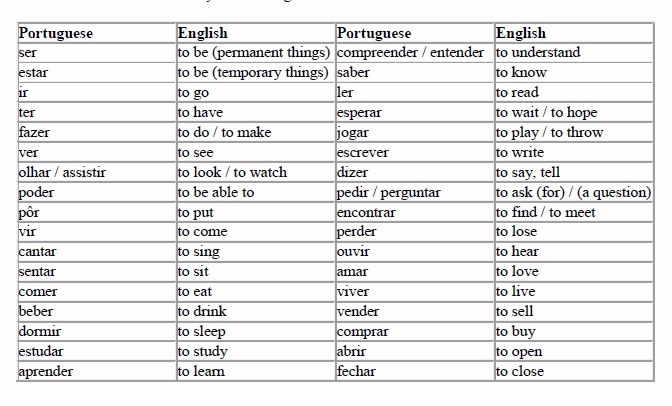
Portuguese Words
Learn basic Portuguese words, used every day in a variety of situations. We have handpicked Portuguese words you can't get by without. Note: adjectives must agree with gender of noun (i.e. um gato preto / uma mala preta).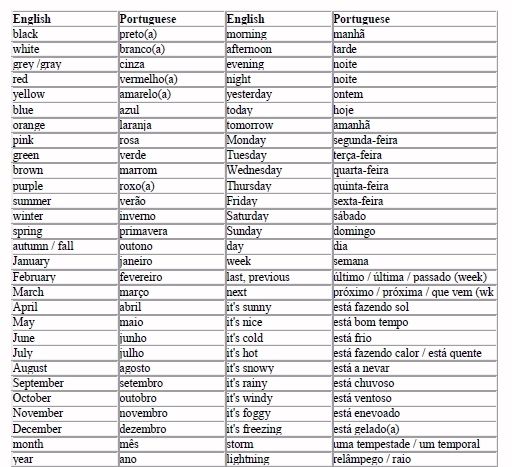
Portuguese Phrases
Portuguese phrases you need to know to kick off a basic conversation. Greetings, common sayings and idiomatic expressions learners need to know.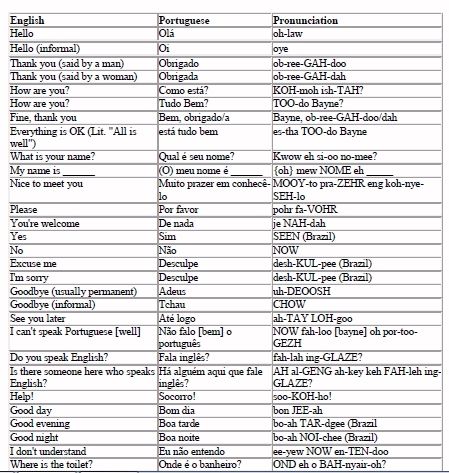
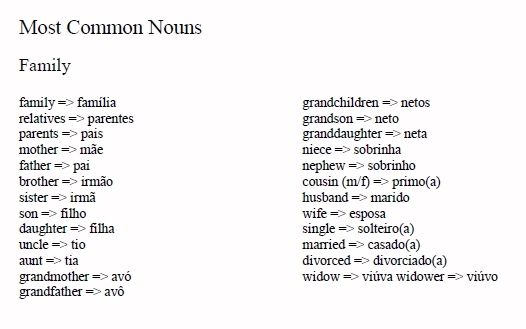
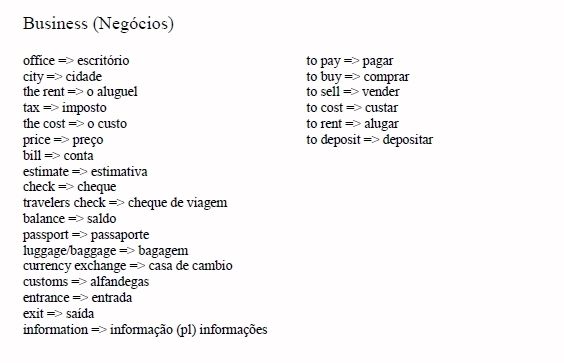
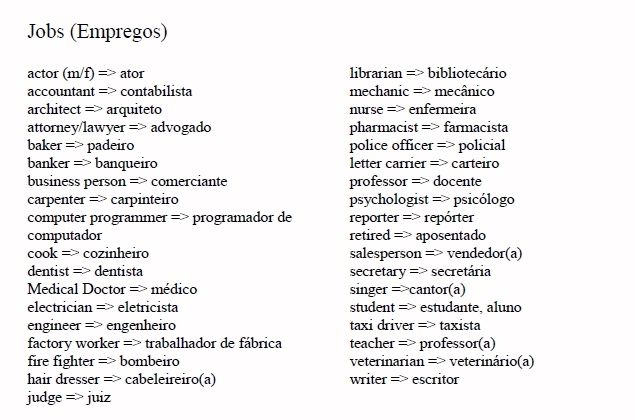
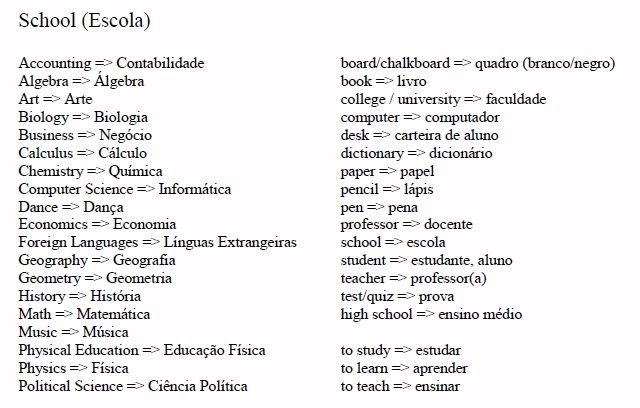
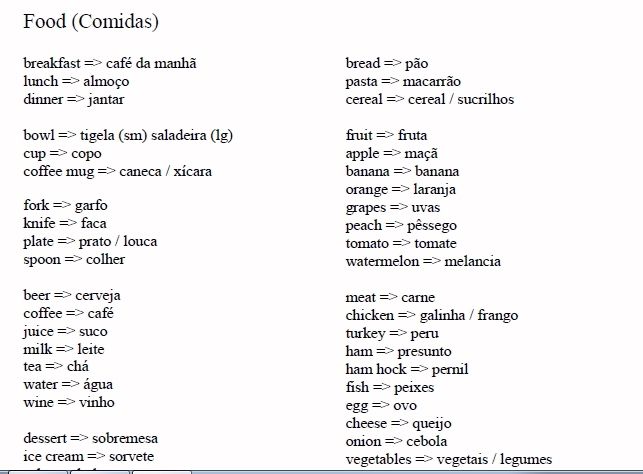
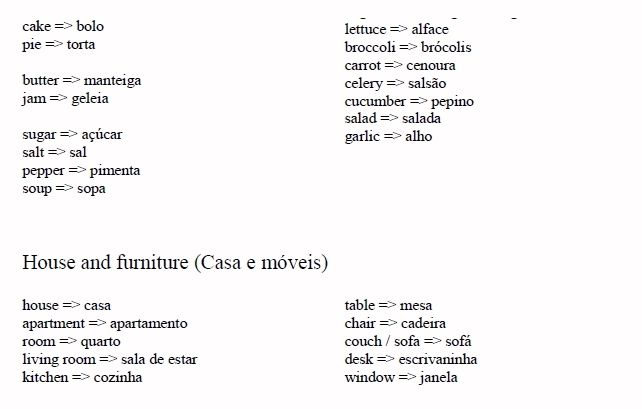
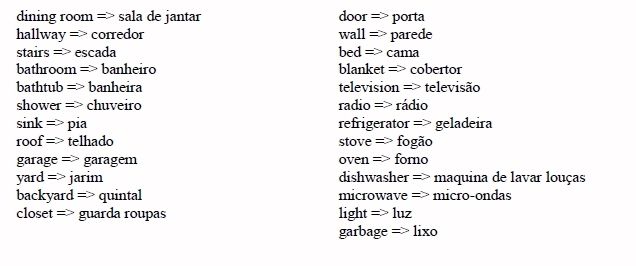
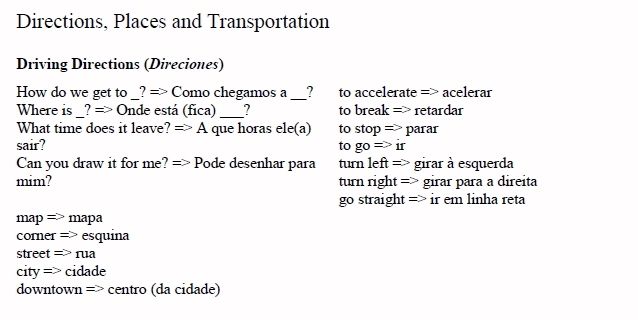
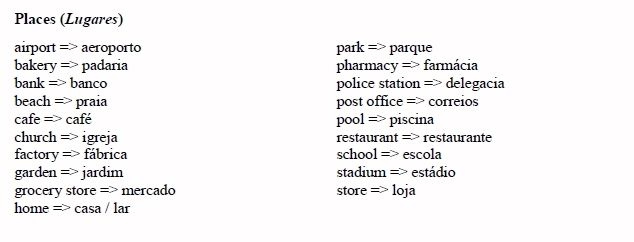
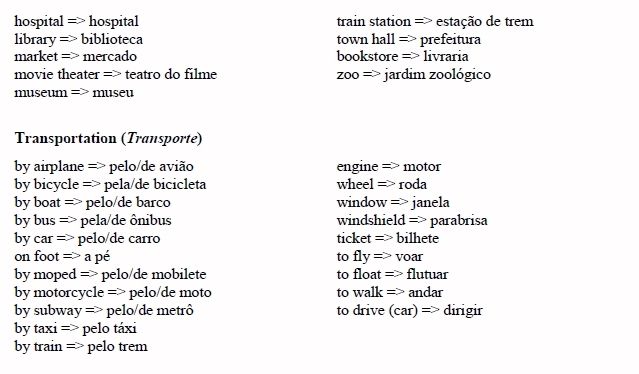
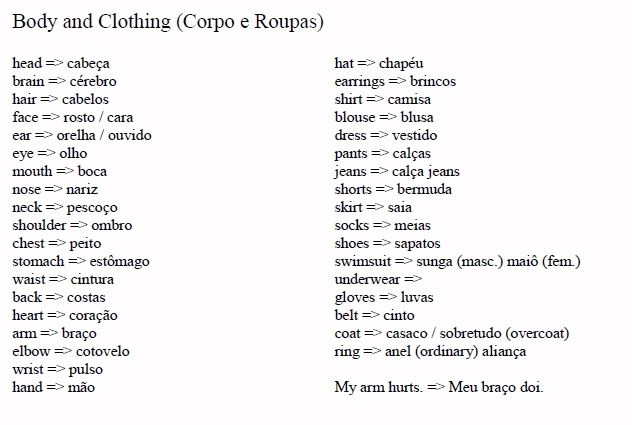


Cheers,
James Expat-blog Experts Team
Oh my, thank you so much for this wonderful contribution! This is super helpful! Thanks a bunch!

Dear Sir....
Any website have a portugues language Learning CDs ,Videos,MP3 like a Good Tutor
Reason : Please post your ad in the Language classes in Brazil section
I'm a brazilian woman trying to refresh my old fanshioned English. These tips were very helpful for me because I could learn the meaning of some Portuguese words in English. Thanks a lot!
I'd love to learn modern expressions. I was talking to a friend and he told me that "It's raining cats and dogs" is no longer used by the youngest people. Is it true? If so, what's the equivalent to this one and others? I'd like to see them posted here. Many thanks in advance
I started grasping some of these intuitively at a certain point , but it's good to see it all spelled out....good system
I saw this a while ago though , got anymore tips?
Brazilian idiomatic phrases and what they mean
Just like we've got idiomatic phrases that describe things or situations so do the Brazilians. Sometimes ours and theirs are very much alike, other times they just seem to make no sense at all. Here are just a few of them.
(ter) uma faca e queijo na mão - the literal translation means to have a knife and a cheese in hand which means absolutely nothing to us. What it means to Brazilians is to be in a very advantageous position or be able to do something with extreme ease. What it roughly translates to in terms of English idomatic phrases is to be in the catbird seat.
Obama sabe bem que está com a faca e o queijo na mão ao entrar no debate desta noite.
Obama is well aware that he is in the catbird's seat entering tonight's debate. (The Washington Post)
saia justa - literal translation a tight skirt and once again something that means nothing to us. To a Brazilian it means to be in a difficult and often embarrassing situation, a tight spot, a bind.
Os políticos brasileiros estão passando por uma saia justa por causa das denúncias de corrupção.
The Brazilian politicians are in a tight spot because of the accusations of corruption,
pagar um mico - literally means pay the lemur (animal). What this means to a Brazilian is to make a fool of oneself.
Ela pagou um mico quando pediu ele em casamento na frente de todo mundo.
She made a fool out of herself by proposing to him in front of everybody.
pagar o pato - literally pay the duck. What this one means to Brazilians is to assume the guilt/responsibility for something. Its parallel term in English would be to carry the can.
Dilma vai ter de pagar o pato de novo para a corrupção na Petrobras.
Dilma will have to carry the can again for the corruption in Petrobras.
engolir o sapo - swallow the frog. To a Brazilian this means to keep quiet and not respond to a criticism, or essentially bite your lip/tongue.
Infelizmente, precisei engolir um sapo quando ouvi meu chefe falar sobre aquele erro.
Unfortunately, I had to bite my lip/tongueu when I heard my boss talking about that mistake.
unha e carne (finger) nail and meat. To a Brazilian the means what hand in glove means to us.
Grandes empresas são unha e carne com os politicos corruptos no Brasil.
Big companies are hand in glove with corrupt politicians in Brazil.
Cheers,
James Expat-blog Experts Team
Really enjoyed your post. It's so practical and helpful. I look forward to learning and sharing these tips. 
I am having a difficult time with the concept of a reflective verb. A house selling itself, sit yourself down. Sometimes the "se" precedes the verb, sometimes it follows the verb. Could you help by advising how you mastered this problem. Thank you.
There are some good programs on 'Youtube' for Brazilian Portuguese as well as for "English'. Some are basic to advanced and are good for referance and instruction I also have found apps for Google and Apple that help with the language most are free yet basic.
Ouidah wrote:I am having a difficult time with the concept of a reflective verb. A house selling itself, sit yourself down. Sometimes the "se" precedes the verb, sometimes it follows the verb. Could you help by advising how you mastered this problem. Thank you.
Well there are a few basic rules:
In formal language we would not generally start a sentence with a "pronome oblíquo". However with a verb in the imperative we do start the sentence with the oblique.
Example: Me deixe em paz! to say Deixe-me em paz would not be imperative.
Some words "attract" the oblique to the front of the verb, especially negatives like (no, not, never), adverbs (hoje, aqui, sempre, talvez, muito...)
There is a very comprehensive explanation of oblique/reflexive pronouns here:
http://educacao.uol.com.br/disciplinas/ … atonos.htm
Cheers,
James Expat-blog Experts Team
Here are some good sites
www.duolingo.com - Basic good for practicing spelling , writing words and learning vocabulary , not much else - FREE
http://www.semantica-portuguese.com/ - Great fully produced and acted out video lessons- excellent for beginners learning grammar , all the way up to upper intermediate , lots of listening practice too . You have to pay about $12 per month but I used it for half a year and learn't loads.
https://streamnative.com/ - New site I found , loads and loads of free content , quite advanced and excellent for learning practice - 90% FREE
hope these help , I found them to be good tools
Differences between porque / porquê / por que / por quê / para que / para quê
Probably the most confusing part of the Portuguese language is the various porques. Hope this will help you sort it out.
PORQUE - is a clausal conjunction or explanation closest to "pois" or "uma vez que"
Examples: Não fui ao cinema porque tenho que estudar para a prova. (pois)
Não vá fazer intrigas porque prejudicará você mesmo. (uma vez que)
PORQUÊ - is a NOUN, it translates to A/THE REASON or A/THE MOTIVE. It is accompanied by an article, pronoun, adjective or number.
Examples: O porquê de não estar conversando é porque quero estar concentrada. (motivo)
Diga-me um porquê para não fazer o que devo. (uma razão)
POR QUE - has two different uses: It is the junction between the preposition POR and the interrogative or indefinite QUE. It carries the meaning "for what reason" or "for what motive".
Examples: Por que você não vai ao cinema? (por qual razão)
Não sei por que não quero ir. (por qual motivo)
or
When it is the junction the preposition POR and the relative pronoun QUE, it carries the meaning of "for that/because of that" (pelo qual).
Example: Sei bem por que motivo permaneci neste lugar. (pelo qual)
POR QUÊ - used before a punctuation mark (period, exclamation mark or question mark), and for this reason must have an accent. Still means for why or for what reason.
Examples: Vocês não comeram tudo? Por quê?
Andar cinco quilômetros, por quê? Vamos de carro.
PARA QUE - used mostly in the interrogative and meaning why or what reason.
Example: Para que você precisa disso?
PARA QUÊ - same as above when it comes before a punctuation mark.
Example: Você precisa disso para quê?
I just found a Facebook page that might be of a great deal of help to everyone who is learning Portuguese. It is full of tips and tricks, explanations and things to discover.
https://www.facebook.com/portuguescombr/timeline
ENJOY!!!
Cheers,
James
expat.com Experts Team
"Thankyou - Unlike in "Continental" Portuguese here MEN always say OBRIGADO and WOMEN always say OBRIGADA no matter who they are speaking to. This is different in Portugual where you say OBRIGADA to women and OBRIGADO to men regardless of the speaker's gender."
Not so here in Lisbon. Men say obrigado, women say obrigada. There are some weird exceptions when people are serving you in shops, but generally it is the rule.
Hi Dirk,
Have things changed there recently and/or is it different than in other parts of Portugual? When I had a Portuguese girlfriend (from Viana do Castelo) 15 years ago, she was the one who pointed out this difference between Continental Portuguese and Brazilian Portuguese to me, because it was exactly opposite to what I was learning in my Brazilian Portuguese classes. I questioned here specifically on it when she said obrigado to men and obrigada to women. Even with the so-called harmonization of the language in Portuguese speaking countries nothing has changed here in Brazil, it's still always obrigado from men and obrigada from women. I'm really curious to know of the evolution of the language there over the past decade.
Cheers,
James
expat.com Experts Team
Been here 18 months now and it's as I say. It is the advice in phrase books too. Maybe your girlfriend had found a sneaky way to put other women
off you!
There is a general opinion that the amount of Brazilian TV shown in Portugal has had a big influence. Like US TV does in the UK.
Most of the language learning resources online are Brazilian Portuguese too, so tourists talk about cachorros and abacaxís instead of cães and ananás.









